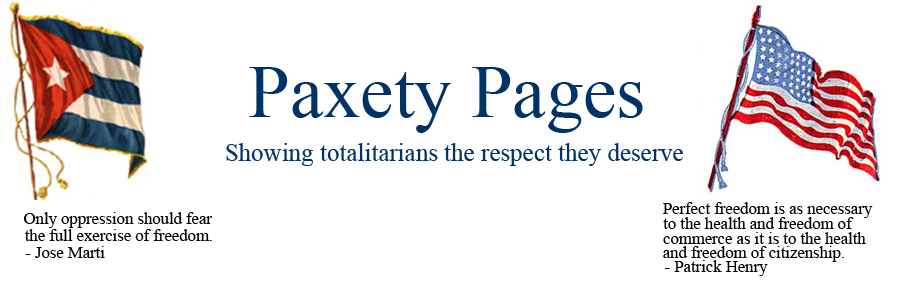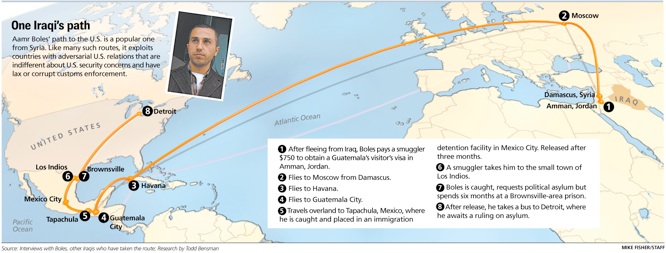The Washington Times reports that two Pakistanis with terrorist connections were caught crossing the US border with Mexico back in September.
Muhammad Azeem and Mukhtar Ahmad, both in their 20s and from Gujrat, were caught Sept. 20 by agents south of San Diego and just over the international border from Tijuana. When agents checked their identities through databases, they got hits on both of them: Mr. Ahmad popped up as an associate of a known or suspected terrorist, while Mr. Azeem’s information had been shared by a foreign government for intelligence purposes.
Former Texas governor Rick Perry has long complained that Middle Easterners have used Mexico as a jumping off point to get into the US.
But it’s not only Mexico. Cuba and Venezuela have also assisted the terrorist war on their common enemy – the United States. We here at Paxety Pages have long warned of possible terrorist entry into the country through the southern border. Back in 2007, we featured stories by reporter Todd Bensman who followed the route from Syria to Texas.
While the links below no longer work, Bensman still has his original stories on his website.
Here’s the original Paxety Pages post:
Our old friends chavez and castro helping illegals reach the US
 If you read anything today, read the four-part series Breaching America: War refugees or threats – written by Todd Bensman and published in the San Antonio Express News (the series begins here). Bensman went to Damascus, Syria to track how folks from terrorist supporting countries, as well as Iraq war refugees, are sneaking into the US. One way is to get a visa from a country near the United States, and there pops up our old nemesis, hugo chavez:
If you read anything today, read the four-part series Breaching America: War refugees or threats – written by Todd Bensman and published in the San Antonio Express News (the series begins here). Bensman went to Damascus, Syria to track how folks from terrorist supporting countries, as well as Iraq war refugees, are sneaking into the US. One way is to get a visa from a country near the United States, and there pops up our old nemesis, hugo chavez:
Venezuela is another jumping-off point to the American border, according to court records of smuggling cases.
Because of its antagonistic relationship with the United States, Venezuela does not cooperate on counterterrorism measures, according to the U.S. government, and shows no concerns about issuing visas to special-interest migrants.
One day recently, the Venezuelan Embassy in Damascus, its walls bedecked with large portraits of Venezuelan President Hugo Chávez, was packed with Syrians seeking one of nine types of visas offered.
The U.S. State Department has complained in recent years about Venezuela’s cozy relationship with Syria and Iran. Earlier this year, the first nonstop flights began from Tehran, Iran, to Caracas, Venezuela — a development that some U.S. counterterrorism specialists say opens a new avenue for potential terrorists to the American border.
Some of the government’s most senior Homeland Security officials have spoken of yet another source of terrorist infiltrators: the area where Paraguay, Brazil and Argentina meet, known as the “Tri-Border” region.
Tens of thousands of Arab immigrants there have been under scrutiny by American intelligence services since 9-11. The U.S. Treasury Department in December named people and organizations that “provided financial and logistical support to the Hezbollah terrorist organization.”
Last year, Gen. Bantz J. Craddock, commander of the U.S. Army’s Southern Command
, warned the House Armed Services Committee that some of these groups “could move beyond logistical support and actually facilitate terrorist operations.”
Other countries helping illegal immigrants reach the US are Guatemala and, of course, Cuba.
Cuba’s consul in Damascus said in an interview that his country happily grants visas to any Middle Easterner who asks “because America doesn’t give anyone the opportunity to take refuge, especially after 9-11.”
“But we work another way,” said Armando Perez Suarez. “We put conditions on American people who are making war with everyone. The Arab people are the peaceful ones. We give visas to anybody who wants to visit our country.”
Suarez said he is well aware that Cuba, with its economic problems and poverty, is not anyone’s idea of a final destination.
“After that, if he wants to travel to any other country, the U.S., or Central America, this is not our problem,” Suarez said. “It’s not our burden.”
He scoffed at American concerns about terrorist infiltration.
“I’m sorry your president is from Texas,” he said. “Now you’re receiving your own medicine. The problem started in Texas and it’s finishing in Texas.”
Bensman also mentions documents showing contacts between al-Qaeda and Colombian narcotics terrorists.
Michelle Malkin interviewed Bensman on the O’Reilly Factor last night, and Hugh Hewitt interviewed him for an hour on his show last night (transcript here). The Express-News says this about their reporting:
To document the hidden world of special-interest aliens, San Antonio Express-News reporter Todd Bensman and photographer Jerry Lara traveled to Damascus, Syria; Amman, Jordan; throughout Guatemala; the southern border state of Chiapas, Mexico; Brownsville and elsewhere along the Texas border; and Michigan. Bensman documented routes used by smugglers to move immigrants from Islamic countries, including a popular one from Syria to Texas traveled by Iraqi refugee Aamr Bahnan Boles.
The Express-News hired Arabic language interpreters in Syria, Jordan and Texas, where Boles was first interviewed extensively. Bensman obtained materials from overseas smuggling investigations and hundreds of daily intelligence summaries reflecting Texas border crossings. He interviewed U.S. and Mexican law enforcement officials in both countries, and examined U.S. court records from a dozen federal smuggling prosecutions. Some dialogue and scenesdescribed in this series were reconstructed based on interviews with Boles and, when possible, others who were present.
Also interesting is Bensman’s description of Mexico’s efforts to stop terrorists. He reports the country fears an attack against the US originating from Mexican soil, so the Mexican police make an effort to find Middle Easterners.

